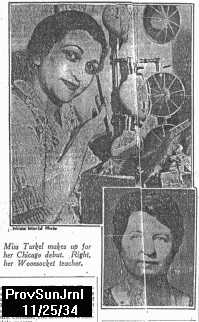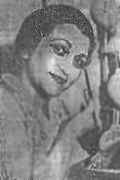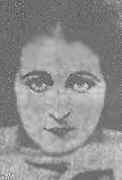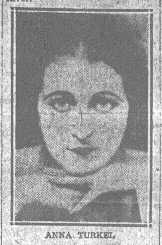 The Providence Sunday Journal from November 25, 1934
More About Anna Turkel,
Candy-Girl Become Diva
And Especially About How Her First Music Teacher
Up in Woonsocket Saw the Possibilities in the Little
Pupil and Encouraged Her Along the Hard Road Up
BY WILFRED E. STONE
"SOME day you'll sing in the Metropolitan!" It was just under 20 years ago
that a Woonsocket music teacher, a bit more than half in earnest, made this
kindly jesting prophecy to a promising pupil. Now Anna Turkel, who was then
beginning her music in the studio of Mrs. Christiana Caya Cavedon, has
fulfilled her teacher's visions of stardom by singing in the Chicago Opera
House. Surely it is not too much to hope that the Metropolitan, America's
highest musical triumph, may be but a few steps ahead. And of all the
Woonsocket friends who are now sharing in the triumph of their idol, none is
more delighted than Mrs. Cavedon. None was more confident that Anna could do
it.
In the same sunny studio, overlooking the pleasant Blackstone street section
of Woonsocket, and beside the same piano where Anna used to practice, Mrs.
Cavedon told the story of her favorite pupil.
There has been many a long hour of practice, many a day of study and effort,
between those simple days in Woonsocket, and Anna's recent triumphs in
Chicago. There have been days of self-denial, too, if not actual privation,
for a musical education costs a lot of money. Anna was determined that she
would do it all for herself, if possible, and the story of her candy-selling
days in the Metropolitan in New York has now been frequently told. Her
recent debut at Chicago was an event heralded throughout the country.
SAW POSSIBILITIES IN THE SEVEN-YEAR-OLD
Anna was seven when she came to Mrs. Cavedon. She was a bright-faced, golden
haired little Jewess. Attractive, sprightly and sparkling, she was a miss to
win and to charm. She came to study piano and to sing. Very patiently she
sat on the stool of the concert grand in Mrs. Cavedon's room, faithfully
learning the "one, two, threes," holding pennies
on her wrists in order that her finger motion might be finger motion alone,
and not a flourish of the arms and
body.
When Mrs. Cavedon heard Anna sing, it didn't take her long to see that her
voice was most unusual. The future of a mezzo-soprano, coloratura, dramatic
soprano, seemed easily possible. With her talents, too, Anna was always a
sweet, mild-tempered girl, in every way attractive. Her face and figure were
no small asset, either. Her teacher used to say, "Anna, you will have to
look out you are too pretty."
And Anna would smile. You could see it made her happy to be told of her
possibilities, but she never "lost her head" - nor her heart.
Anna attended the Woonsocket public schools, and in due time reached the
high school. Teachers everywhere speak well of her, and say what a
first-rate pupil she was. Giving her soul to music didn't prevent her from
giving her head and
intellect, or a goodly portion of it, to plain everyday school work. She
sang in the school choruses, took part in school clubs and activities.
On Sabbaths and/other sacred days she accompanied her parents to the B'nai
Israel Synagogue where the strict religious customs of the orthodox Jews,
were kept up. The music of the synagogue is difficult, but she mastered it
well. She often sang in the synagogue choir.
WOONSOCKET DEBUT A SUCCESSFUL ONE
Years went by rapidly, as years will, and the lovable child became the
winsome young woman. Anna kept up her music, and progressed continually. In
speech she used excellent English. With the capacity that came to her,
perhaps, from her parents' race, she easily mastered French, German and
Italian. All these come useful in the career of a singer.
In due time she was able to give a recital. It was on Sept. 18, 1920 that
she appeared in this way as mezzo-soprano in the old Elks Hall, Woonsocket,
now called Federal Hall. She was assisted by Jacobus Bartman of Boston,
tenor, and her accompanist was her faithful friend and teacher, Mrs.
Cavedon. The debut was a complete success. The Providence Sunday Journal from November 25, 1934
More About Anna Turkel,
Candy-Girl Become Diva
And Especially About How Her First Music Teacher
Up in Woonsocket Saw the Possibilities in the Little
Pupil and Encouraged Her Along the Hard Road Up
BY WILFRED E. STONE
"SOME day you'll sing in the Metropolitan!" It was just under 20 years ago
that a Woonsocket music teacher, a bit more than half in earnest, made this
kindly jesting prophecy to a promising pupil. Now Anna Turkel, who was then
beginning her music in the studio of Mrs. Christiana Caya Cavedon, has
fulfilled her teacher's visions of stardom by singing in the Chicago Opera
House. Surely it is not too much to hope that the Metropolitan, America's
highest musical triumph, may be but a few steps ahead. And of all the
Woonsocket friends who are now sharing in the triumph of their idol, none is
more delighted than Mrs. Cavedon. None was more confident that Anna could do
it.
In the same sunny studio, overlooking the pleasant Blackstone street section
of Woonsocket, and beside the same piano where Anna used to practice, Mrs.
Cavedon told the story of her favorite pupil.
There has been many a long hour of practice, many a day of study and effort,
between those simple days in Woonsocket, and Anna's recent triumphs in
Chicago. There have been days of self-denial, too, if not actual privation,
for a musical education costs a lot of money. Anna was determined that she
would do it all for herself, if possible, and the story of her candy-selling
days in the Metropolitan in New York has now been frequently told. Her
recent debut at Chicago was an event heralded throughout the country.
SAW POSSIBILITIES IN THE SEVEN-YEAR-OLD
Anna was seven when she came to Mrs. Cavedon. She was a bright-faced, golden
haired little Jewess. Attractive, sprightly and sparkling, she was a miss to
win and to charm. She came to study piano and to sing. Very patiently she
sat on the stool of the concert grand in Mrs. Cavedon's room, faithfully
learning the "one, two, threes," holding pennies
on her wrists in order that her finger motion might be finger motion alone,
and not a flourish of the arms and
body.
When Mrs. Cavedon heard Anna sing, it didn't take her long to see that her
voice was most unusual. The future of a mezzo-soprano, coloratura, dramatic
soprano, seemed easily possible. With her talents, too, Anna was always a
sweet, mild-tempered girl, in every way attractive. Her face and figure were
no small asset, either. Her teacher used to say, "Anna, you will have to
look out you are too pretty."
And Anna would smile. You could see it made her happy to be told of her
possibilities, but she never "lost her head" - nor her heart.
Anna attended the Woonsocket public schools, and in due time reached the
high school. Teachers everywhere speak well of her, and say what a
first-rate pupil she was. Giving her soul to music didn't prevent her from
giving her head and
intellect, or a goodly portion of it, to plain everyday school work. She
sang in the school choruses, took part in school clubs and activities.
On Sabbaths and/other sacred days she accompanied her parents to the B'nai
Israel Synagogue where the strict religious customs of the orthodox Jews,
were kept up. The music of the synagogue is difficult, but she mastered it
well. She often sang in the synagogue choir.
WOONSOCKET DEBUT A SUCCESSFUL ONE
Years went by rapidly, as years will, and the lovable child became the
winsome young woman. Anna kept up her music, and progressed continually. In
speech she used excellent English. With the capacity that came to her,
perhaps, from her parents' race, she easily mastered French, German and
Italian. All these come useful in the career of a singer.
In due time she was able to give a recital. It was on Sept. 18, 1920 that
she appeared in this way as mezzo-soprano in the old Elks Hall, Woonsocket,
now called Federal Hall. She was assisted by Jacobus Bartman of Boston,
tenor, and her accompanist was her faithful friend and teacher, Mrs.
Cavedon. The debut was a complete success.

The time had now come when she must step outside of Woonsocket if she was to
stride further along the road to her career. None knew better than her
teacher that she must head for a bigger town. The vision of the
Metropolitan was still before her.
She went to New York and somehow managed to land the job of candy girl in
the Metropolitan Opera House. A candy girl has to attend all the
performances, evening and matinee, and her job is to sell candy between the
acts, also before performances, and whenever the trade can be plied without
interfering with the performance.
But Anna was there more than to sell candy. She was there for the privilege
of hearing the great singers of her day, and to fit herself to imitate them.
Some day she hoped to be on the stage, in the centre of things, with the
plaudits coming her way, while other candy girls, perhaps might stand around
the walls and admire her voice.
She used her money to support herself and to pay for singing lessons with
good teachers. This is what meant self-denial, almost privation. She would
write to Mrs. Cavedon, "Sometimes I have only one sandwich, for Oh, so
long." It may have been because of her independence may have been because
of her independence, for other friends in Woonsocket say here parents and
relations were reasonably well-to-do and helped her with money.
DELINQUENT AS CANDY GIRL
Anna's Job was behind the candy counter, and there she was at all times when
there was candy to be sold. When the program was on she became one of the
audience at the concert, even though this meant a kind of desertion from her
job.
Emil Katz, in charge of Metropolitan refreshments, winked at her
delinquency. In fact he encouraged it because he knew that she was in the
Metropolitan, not because she liked sweets, but because she had made up her
mind seriously to learn opera from all angles before starting on her musical
career.
Soon it became known around the opera house that Anna Turkel, the "candy
girl," had a voice. The first artist to take an interest in the girl who was
selling candy in order to hear opera, was Antonio Scotti. He referred her to
Maestro Wilfrid Pelletier, assistant conductor, who offered to coach her in
some roles, and made it possible for her to study voice seriously. Then some
fashionable members of the Metropolitan Opera Club learned of her voice and
her ambitions.
The first to hear her was the club's secretary. Edward Dockray, a native
Rhode Islander, by the way. He was so much impressed with her musical talent
that he told other members. Soon she was able to give up her work behind the
candy counter because 10 members of the club offered to pay for her lessons.
Names that were mentioned in this connection were Mrs. Frederick Brown, Mrs.
Ralph Jones, Jules Bache, Ludwig Vogelstein and Lewis Strauss of Newark, N.J.
"COUNTRY BUMPKIN" IN GOTHAM AND CAIRO
In 1921 her Parents moved from Woonsocket to New York in order that Anna
might live at home. Her father had been a clothing merchant in Woonsocket.
Some time after his removal to New York he died, and Anna continued to live
with her mother, Mrs. Lena Turkel, and the seven brothers and sisters. She
gives credit to every one of the nine other members of her family for their
cooperation toward her success.
In 1926 she gave a song recital in the Town Hall, New York, and wrote home
to her old teacher, "you would have been proud of your country bumpkin."
Then came the tour abroad and Anna's triumphs in Italy, where she sang in
Genoa, have been many times told. From Italy she went on to Egypt, where she
was still pursuing her studies in 1931. On Feb. 15 of that year she sang the
title role of "Aida" in the Royal Opera House, Cairo.
But news came to her that on account of the depression the financial support
she had been receiving must be withdrawn. With money sent her to return to
New York she stayed on, continuing her work and determined to succeed. In
Cairo her success was such that the American Ambassador broke a rule of long
standing to seek her out and give her personal congratulations.
From Egypt she returned to New York, and continued her studies there, until
her recent engagement with the Chicago Opera House.
Anna's nearest relative who lives in Woonsocket is her mother's sister, Mrs.
Nathan Falk of 266 Park Place. The Falks are as enthusiastic for their niece
as Mrs. Cavedon is for her pupil. They speak with great pride of her.
Mrs. Falk says Anna was born in the house at 26 Park Place, though the
Turkels afterward moved to 59 Hamlet avenue. Anna's birthday was Nov. 19,
1905, so that her operatic triumphs come almost as an observance of her 20th
birthday. Mrs. Falk speaks glowingly of Anna as a child. She loved her
brothers and sisters and got plenty of chance to play at home making, what
with the care of seven smaller than herself. She could cook many a dainty
and tasty dish. She could wash and dress the little Turkels with all the
skill of an accomplished mother.
In fact the one regret the Falks express is that Anna did not grow up to be
a wife and head of a happy little family, as some of the rest of the family
have done. They do not grudge her success, but the regret is there, just the
same. Mrs. Falk says her one wish is that Anna had married. But then,
operative fame doesn't always go with home-making, and now that Anna has
succeeded, perhaps they do not feel sorry.
|



